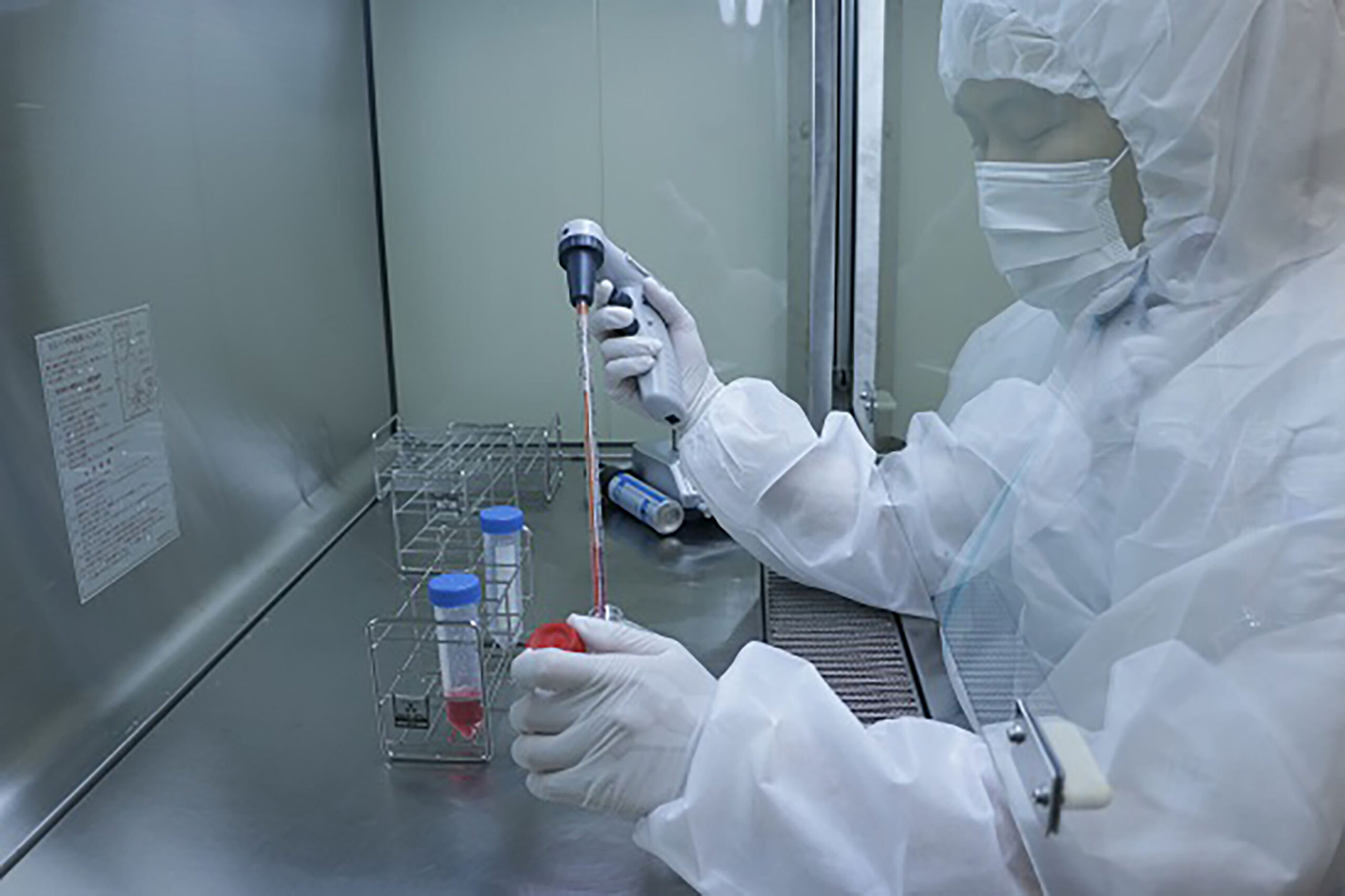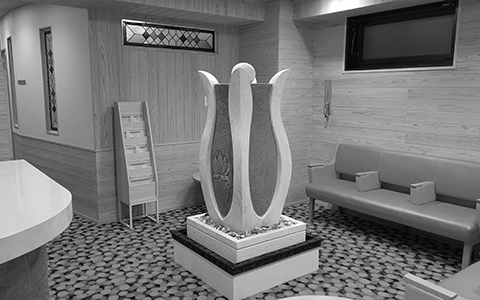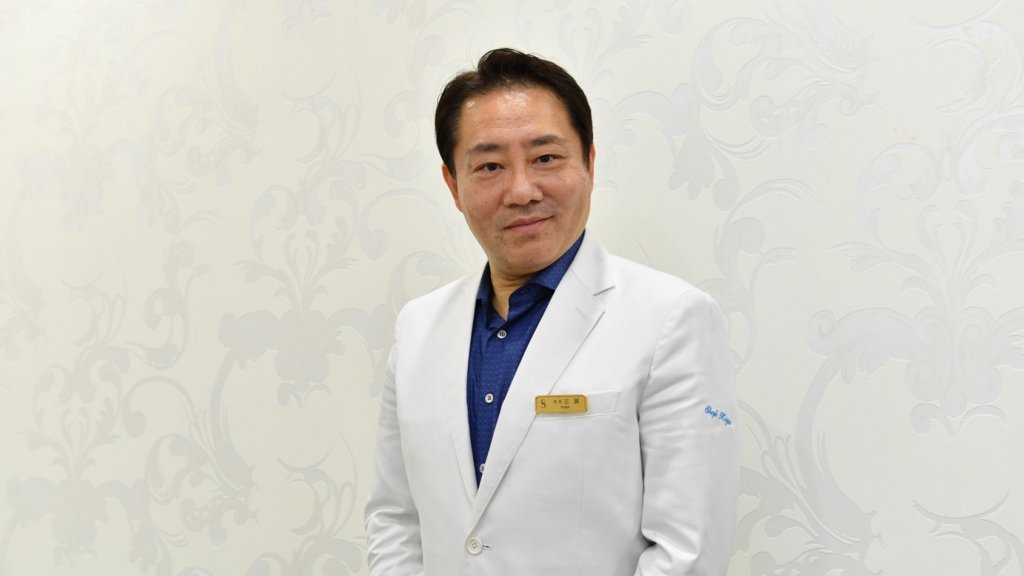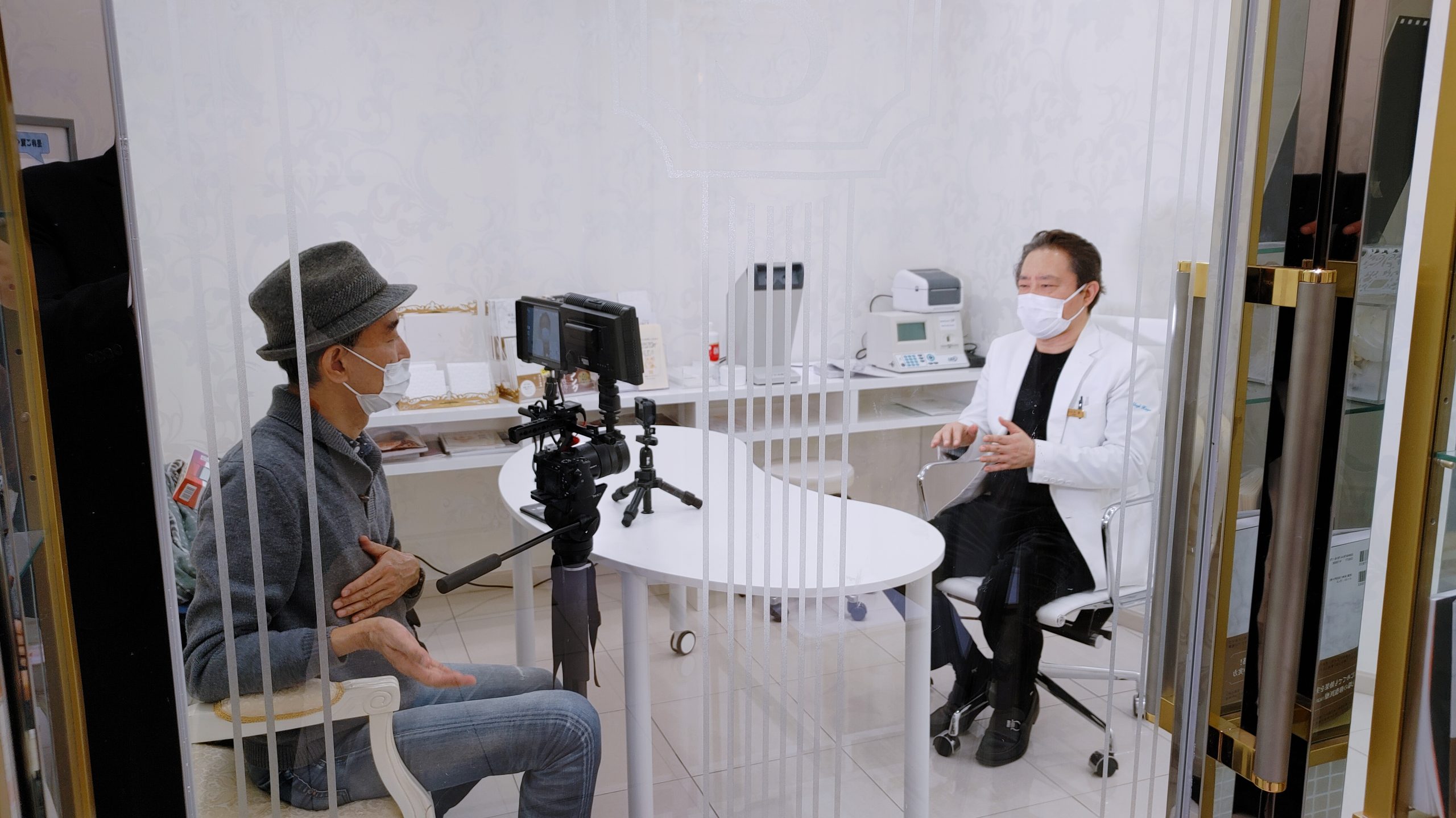1.Contents of Super NK Cell Therapy NK cells are a type of immune cell that play a central role in natural immunity. The functions of the immune system can be divided into “innate immunity,” which involves promptly eliminating external threats, and “adaptive immunity,” which produces specific antibodies against antigens. NK cells constantly patrol the body and immediately attack invading pathogens, including cancer cells and infected cells. The body’s cancer suppression mechanisms can be categorized into intracellular mechanisms, centered around “cancer suppression genes,” and extracellular mechanisms involving the actions of immune cells. It is said that even in healthy individuals, 3,000 to 6,000 cancer cells are generated daily in the body. This occurs when cancer suppression genes fail to prevent cancer development within cells. However, immune cells efficiently eliminate these cancer cells, preventing them from proliferating unchecked within the body. NK cells play a central role in this immune function. The decline in immune function can lead to missed detection of cancer and subsequent proliferation. The role of the immune system in cancer prevention is significant. NK cell therapy involves primarily culturing and expanding NK cells from the patient’s blood and then returning them to the body via intravenous drip to combat cancer. 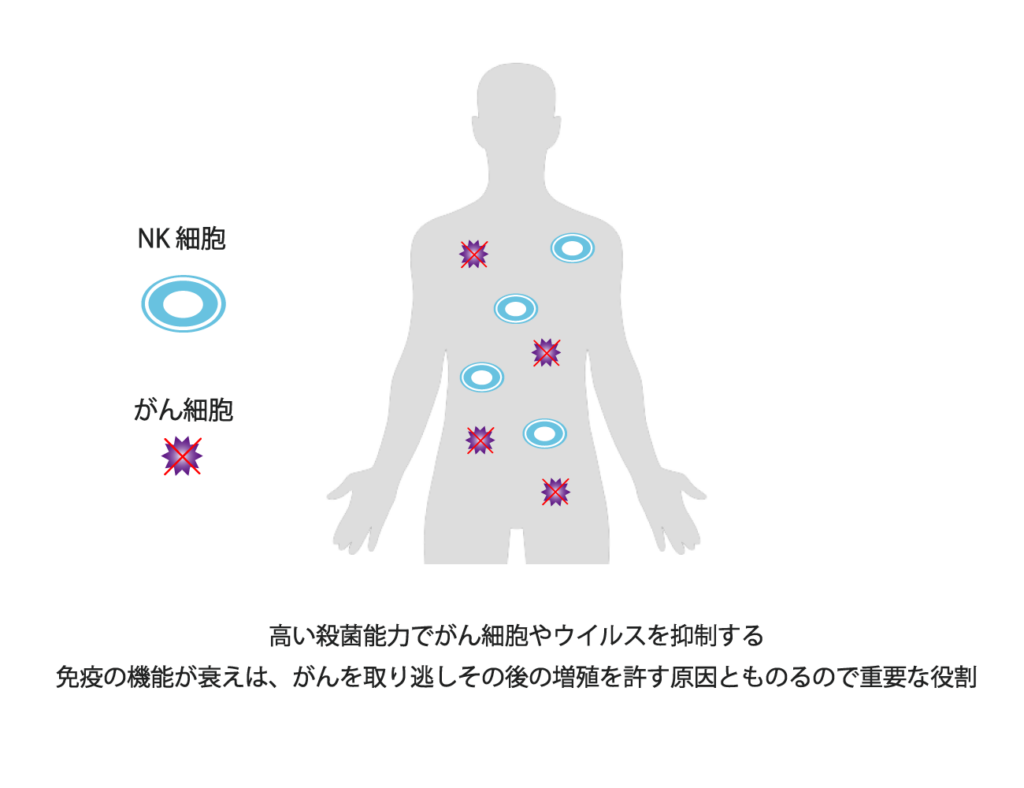 2)Super NK therapy NK cells have the ability to directly attack and destroy cancer cells. Cancer cells that have grown to the point of diagnosis have typically undergone repeated attacks by the immune system, allowing them to evade or neutralize immune attacks and generally possess strong immunosuppressive properties. These cancer cells, which have not been completely eliminated by the immune system’s natural function, are resistant to attack by the immune system’s normal defenses. Immunotherapy for cancer aims to enhance the immune system’s ability to combat cancer through artificial means. Super NK cell therapy involves culturing NK cells (natural killer cells found in lymphocytes in white blood cells) from the patient’s blood and then activating them at 5 times the normal level with SGF® (stem cell growth factor derived from dental pulp stem cells). These activated NK cells are then reintroduced into the body via intravenous drip to combat cancer. This therapy utilizes the patient’s own immune cells, resulting in fewer side effects, and specifically targets cancer cells using NK cells, which have a high capacity for cancer cell destruction, leading to relatively rapid onset of effects. *SGF® (Solaria Growth Factor) is a collective term for the dental pulp stem cell culture supernatant purified by the Solaria Clinic Group’s proprietary protocol. 3)Five features of Super NK Cell Therapy 1.Comprehensive Coverage for All Stages, Virtually All Cancers: Treatment is possible for nearly all cancers, excluding certain types such as T-cell/NK-cell/NKT-cell type leukemia/lymphoma. ・Effective against residual cancer cells after surgery ・Inhibition of cancer cell proliferation ・Prevention of recurrence and metastasis 2.Compatible with Standard Treatments It is possible to combine with surgical procedures, chemotherapy, and radiation therapy. 3.Treatment Possible with Outpatient Visits Treatment is feasible on an outpatient basis, with minimal physical burden. The initial blood collection procedure takes approximately one hour, while the time for intravenous infusion is about one hour. 4.Minimal Side Effects As NK cells are cultured and activated from the patient’s own blood, there are minimal side effects. Additionally, in cases where continuation of treatment is deemed difficult with other cancer therapies, immunotherapy may offer the possibility of continued treatment. 5.Approved Regenerative Medicine Treatment Plan This treatment is conducted with approval from the Ministry of Health, Labour and Welfare, under a regenerative medicine supply plan. Facilities conducting cell culture have also obtained approval from the Ministry of Health, Labour and Welfare, establishing highly advanced safety management systems for cell culture. Comparison of treatment methods and side effects.
2)Super NK therapy NK cells have the ability to directly attack and destroy cancer cells. Cancer cells that have grown to the point of diagnosis have typically undergone repeated attacks by the immune system, allowing them to evade or neutralize immune attacks and generally possess strong immunosuppressive properties. These cancer cells, which have not been completely eliminated by the immune system’s natural function, are resistant to attack by the immune system’s normal defenses. Immunotherapy for cancer aims to enhance the immune system’s ability to combat cancer through artificial means. Super NK cell therapy involves culturing NK cells (natural killer cells found in lymphocytes in white blood cells) from the patient’s blood and then activating them at 5 times the normal level with SGF® (stem cell growth factor derived from dental pulp stem cells). These activated NK cells are then reintroduced into the body via intravenous drip to combat cancer. This therapy utilizes the patient’s own immune cells, resulting in fewer side effects, and specifically targets cancer cells using NK cells, which have a high capacity for cancer cell destruction, leading to relatively rapid onset of effects. *SGF® (Solaria Growth Factor) is a collective term for the dental pulp stem cell culture supernatant purified by the Solaria Clinic Group’s proprietary protocol. 3)Five features of Super NK Cell Therapy 1.Comprehensive Coverage for All Stages, Virtually All Cancers: Treatment is possible for nearly all cancers, excluding certain types such as T-cell/NK-cell/NKT-cell type leukemia/lymphoma. ・Effective against residual cancer cells after surgery ・Inhibition of cancer cell proliferation ・Prevention of recurrence and metastasis 2.Compatible with Standard Treatments It is possible to combine with surgical procedures, chemotherapy, and radiation therapy. 3.Treatment Possible with Outpatient Visits Treatment is feasible on an outpatient basis, with minimal physical burden. The initial blood collection procedure takes approximately one hour, while the time for intravenous infusion is about one hour. 4.Minimal Side Effects As NK cells are cultured and activated from the patient’s own blood, there are minimal side effects. Additionally, in cases where continuation of treatment is deemed difficult with other cancer therapies, immunotherapy may offer the possibility of continued treatment. 5.Approved Regenerative Medicine Treatment Plan This treatment is conducted with approval from the Ministry of Health, Labour and Welfare, under a regenerative medicine supply plan. Facilities conducting cell culture have also obtained approval from the Ministry of Health, Labour and Welfare, establishing highly advanced safety management systems for cell culture. Comparison of treatment methods and side effects.
| Standard Treatment | Super NK Cell Therapy | |
| Treatment Methods | Surgical Therapy・Chemotherapy・Radiation Therapy | Immunotherapy |
| Side effects | Loss of appetite, diarrhea, hair loss, skin disorders, peripheral neuropathy, bone marrow suppression, etc. | Almost none; mild symptoms such as low-grade fever may occur depending on the patient. |
5)Flow of Super NK Cell Therapy  1.Maturation of dendritic cells When cancer is present, dendritic cells cannot mature due to the action of immunosuppressive cells and substances produced by cancer cells. We integrate immune function activation substances to counteract interference by cancer cells with dendritic cells, allowing for normal antigen presentation. 2.Proliferation and activation of various immune cells such as NK cells, killer T cells, and macrophages We invigorate the entire immune system and boost morale for attacking cancer cells. 3.Direct attack on cancer cells Activated NK cells have the ability to directly attack cancer cells. They can also identify other antigens and attack cancer cells that killer T cells may have overlooked. 4.Reversal of immune suppression and enhancement of immune function The bodies of cancer patients are in a state of immune suppression. Activated NK cells kill immunosuppressive cells. Furthermore, since there are no receptors to catch immunosuppressive substances produced by cancer cells, their movement cannot be restricted. This action aims to improve immune function. 5.Inhibition of angiogenesis Angiogenesis refers to the creation of new blood vessels towards cancer tissue to obtain the nutrients and enzymes required for proliferation. This process involves the use of proteins called angiogenic factors, with vascular endothelial growth factor (VEGF) being a crucial cytokine. Activated NK cells hinder the release of VEGF, thus preventing the formation of new blood vessels. 6.Formation of immune memory Activated NK cells generate immune memory stem cells against cancer cells. This enables the sustained attack on cancer cells over a long period.
1.Maturation of dendritic cells When cancer is present, dendritic cells cannot mature due to the action of immunosuppressive cells and substances produced by cancer cells. We integrate immune function activation substances to counteract interference by cancer cells with dendritic cells, allowing for normal antigen presentation. 2.Proliferation and activation of various immune cells such as NK cells, killer T cells, and macrophages We invigorate the entire immune system and boost morale for attacking cancer cells. 3.Direct attack on cancer cells Activated NK cells have the ability to directly attack cancer cells. They can also identify other antigens and attack cancer cells that killer T cells may have overlooked. 4.Reversal of immune suppression and enhancement of immune function The bodies of cancer patients are in a state of immune suppression. Activated NK cells kill immunosuppressive cells. Furthermore, since there are no receptors to catch immunosuppressive substances produced by cancer cells, their movement cannot be restricted. This action aims to improve immune function. 5.Inhibition of angiogenesis Angiogenesis refers to the creation of new blood vessels towards cancer tissue to obtain the nutrients and enzymes required for proliferation. This process involves the use of proteins called angiogenic factors, with vascular endothelial growth factor (VEGF) being a crucial cytokine. Activated NK cells hinder the release of VEGF, thus preventing the formation of new blood vessels. 6.Formation of immune memory Activated NK cells generate immune memory stem cells against cancer cells. This enables the sustained attack on cancer cells over a long period.
2.Precautions
※Individuals meeting the following criteria are not eligible for treatment. Please be aware of this in advance. ・For cases of malignant lymphoma, there are exclusions depending on the type. Please inform our staff before starting treatment. Treatment is possible for B-cell types. ・Leukemia cases are ineligible for treatment. 1)Side Effects
- Since NK cells cultured and activated from one’s own blood, concerns regarding rejection or allergic reactions are minimal, but symptoms such as fever may occur in approximately 10% of patients. These symptoms typically subside naturally within 24 to 48 hours and can be managed with over-the-counter antipyretics if necessary.
- Patients with a history of rheumatism, connective tissue disease, or other autoimmune diseases may experience exacerbation of their condition.
- Patients currently suffering from interstitial pneumonia may face a risk of deterioration, which could pose a threat to their lives, and may not be suitable for high-activation NK cell therapy.
- In cases of viral hepatitis, particularly severe cases of hepatitis B, there is a risk of symptom exacerbation and worsening severity, possibly leading to life-threatening conditions, due to immune activation.
2)Combination with Immune Checkpoint Inhibitors ・If you plan to use immune checkpoint inhibitors in combination with this treatment, please ensure that you receive them under the permission and supervision of your attending physician. There have been reported cases of severe side effects. If you wish to combine these treatments, please understand the risks involved and be aware that there may be instances where treatment needs to be discontinued.
3.About the Cultivation Facility
The cultivation is conducted at a affiliated medical institution’s cultivation facility (CPC). This facility is registered with the Ministry of Health, Labour and Welfare as a “cell culture processing facility” manufacturing “specified cell processed products” under the “Act on Securing Safety of Regenerative Medicine and Others”. We utilize proprietary patented
technology to safely cultivate NK cells with high activity. 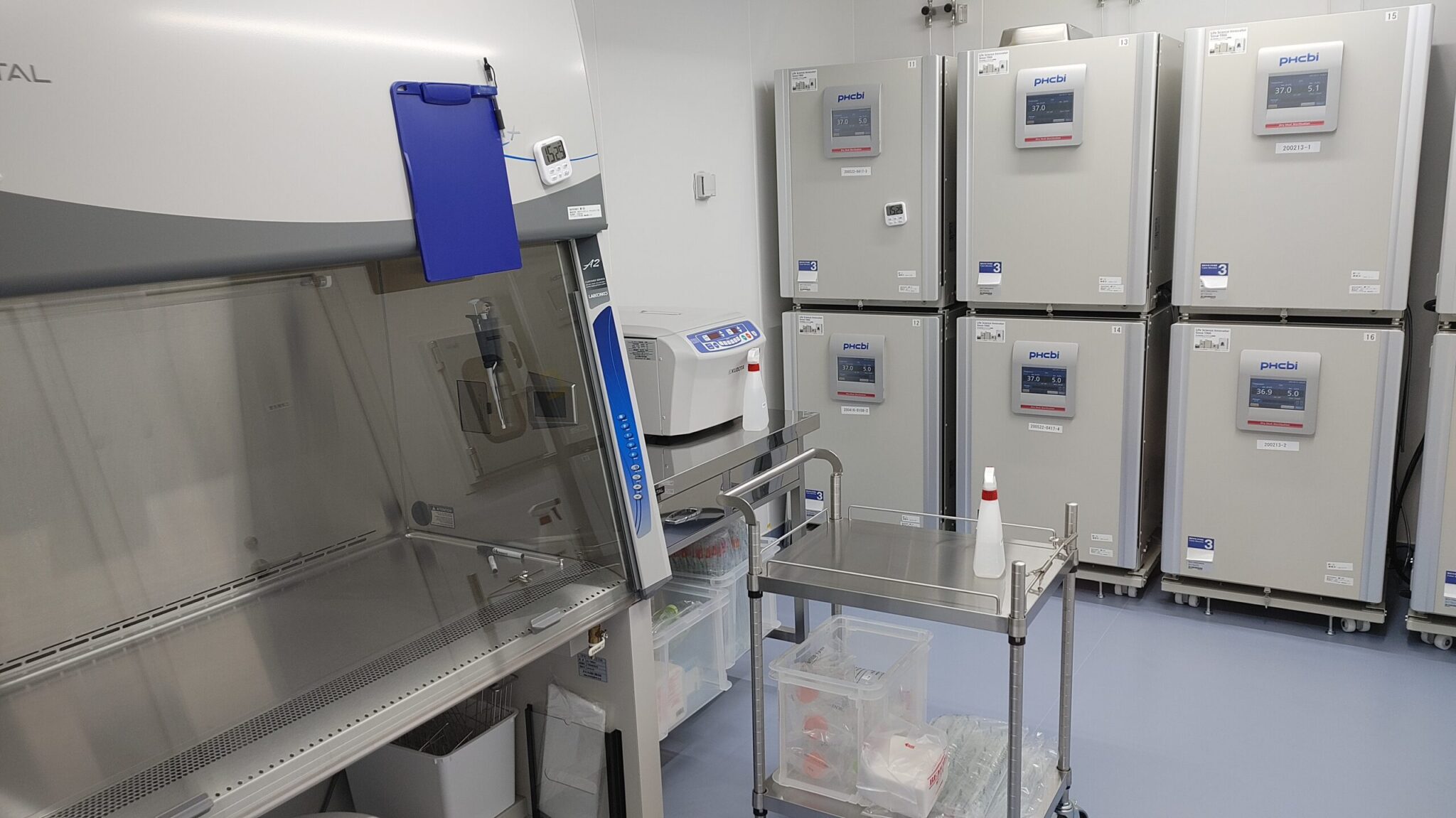
Culturing is conducted by clinical culturing specialists certified by the Japanese Society for Regenerative Medicine. 